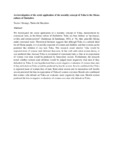Please use this identifier to cite or link to this item:
https://cris.library.msu.ac.zw//handle/11408/3580Full metadata record
| DC Field | Value | Language |
|---|---|---|
| dc.contributor.author | Chisango, Tadios | - |
| dc.contributor.author | Mayekiso, Thokozile | - |
| dc.date.accessioned | 2019-04-29T08:42:50Z | - |
| dc.date.available | 2019-04-29T08:42:50Z | - |
| dc.date.issued | 2013 | - |
| dc.identifier.issn | 0020-7594 | - |
| dc.identifier.uri | https://onlinelibrary.wiley.com/toc/1464066x/48/6 | - |
| dc.identifier.uri | http://hdl.handle.net/11408/3580 | - |
| dc.description.abstract | We investigated the sexist application of a morality concept of Tsika, characterized by communal traits, in the Shona culture of Zimbabwe. Tsika has been defined as “politeness, civility and circumlocution” (Samkange & Samkange, 1980, p. 74), thus generally falling under communal traits. Theoretical literature suggests that although Tsika is a cultural ideal for all Shona people, it is especially expected of women and children, and that women can be punished like children if they lack Tsika. This research tested whether Tsika would be expected more of women (and children) than men. In line with ambivalent sexism theory, it was predicted that, because Tsika is constituted of communal traits, a bias in its expectation of women over men would be predicted by benevolent sexism. Furthermore, the research tested whether women (and children) would be judged more negatively than men if they defaulted on Tsika. It was hypothesized that a more negative evaluation of women than men if they defaulted on Tsika would be predicted by hostile sexism. Results confirmed that Tsika is expected more of women than of men. Benevolent sexism and its interaction with hostile sexism predicted the bias in expectation of Tsika of women over men. Results also confirmed that women who default on Tsika are evaluated more negatively than men. Hostile sexism predicted the bias in negative evaluations of women over men who default on Tsika. | en_US |
| dc.language.iso | en | en_US |
| dc.publisher | Wiley | en_US |
| dc.relation.ispartofseries | International Journal of Psychology;Vol. 48; No. 6: p. 1009-1345 | - |
| dc.subject | Sexist | en_US |
| dc.subject | Shona culture | en_US |
| dc.title | An investigation of the sexist application of the morality concept of Tsika in the Shona culture of Zimbabwe | en_US |
| dc.type | Article | en_US |
| item.fulltext | With Fulltext | - |
| item.grantfulltext | open | - |
| item.openairecristype | http://purl.org/coar/resource_type/c_18cf | - |
| item.cerifentitytype | Publications | - |
| item.openairetype | Article | - |
| item.languageiso639-1 | en | - |
| Appears in Collections: | Research Papers | |
Files in This Item:
| File | Description | Size | Format | |
|---|---|---|---|---|
| An investigation of the sexist application of the morality concept of Tsika in the Shona culture of Zimbabwe.pdf | Abstract | 105.33 kB | Adobe PDF |  View/Open |
Items in MSUIR are protected by copyright, with all rights reserved, unless otherwise indicated.



